| |
"I wanted something that wasn’t shackled to the Promethean chains of naturalism, where you could just express yourself in a way that was visceral. I think there’s a long and wonderful Scots tradition in absurdity, and I think we embrace it because we do get the fact that reality’s far crazier than anything that we could dream up." |
| |
Director Peter Mullan |
Perceptions can be altered by life experience. Can’t be helped. Something that seemed trivial in your youth can take on massive significance when you get a little older. That, my friends, is the way of the world. I first saw Orphans, the directorial debut of actor Peter Mullan, back when it was first released in the UK in 1999. We screened it at the film society I help to run to an audience that seemed to really appreciate it. I remember it as a pitch-black tragi-comedy. Watching it again for the first time in 20 years, I had a slightly different reaction. I’ll get to the specifics in a minute.
As the film begins, a death that will shape the subsequent narrative has already occurred. The matriarch of a Glasgow family has passed away and her four adult offspring are gathered round her open coffin to pay their final respects. It’s here that the tone of the film is set, that of a serious-minded drama that is painted with a layer of dark humour. The pious eldest son, Thomas (Gary Lewis) tells his siblings that they should each cut off a lock of their hair and place it in the coffin so that a piece of them will remain with their mother on her journey, a symbolic gesture that makes an odd kind of sense. His brothers Michael (Douglas Henshall) and John (Stephen McCole) awkwardly comply, and John cuts a lock from the hair of his sister Sheila (Rosemarie Stevenson), whose mobility is severely restricted by her cerebral palsy. Then the distraught Sheila expresses the wish to kiss her mother goodbye and is picked up by John and Michael and angled face downwards towards the coffin to facilitate this. It’s something that the brothers do instinctively and has logic and compassion at its core, but as observed by Mullan in the unbroken wide shot in which this scene plays out, there’s an almost absurdist element to this most unexpected break with convention.
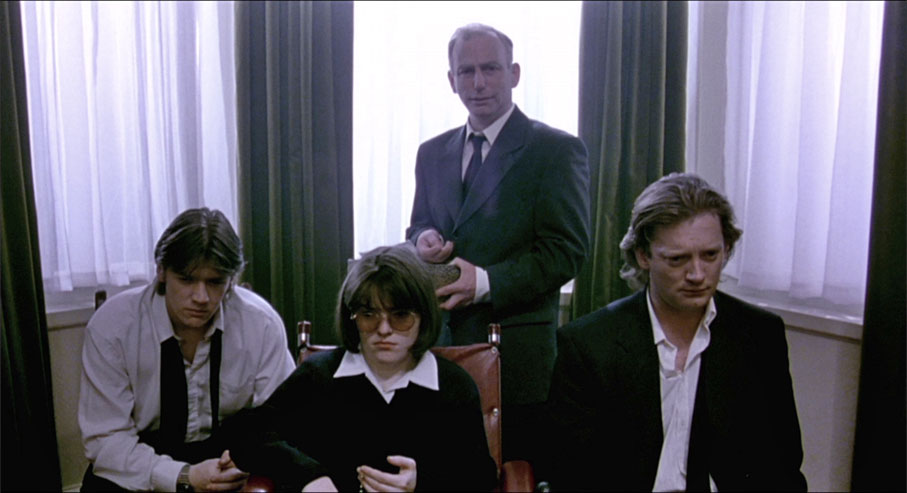
The funeral is set for the following morning and the four siblings are about to confront their grief in very different ways. They begin the evening together at a nightclub where Thomas is foolishly allowed to get up and sing a tribute song to his dear departed mother. As the majority of the patrons sit silently and uncomfortably while Thomas’s tuneless attempt at The Air That I Breathe breaks up into uncontrollable sobs, local hard man Duncan (Malcolm Shields) and his mates continue with their conversation and laughter, which winds up Michael so much that he eventually snaps and punches Duncan in the head. A fight breaks out, and Michael, John and the laughing party are all forcibly ejected, where continued taunting from John prompts Duncan to whirl round on Michael and leave him with a stab wound in the abdomen. When an attempt to transport him to hospital falls at the first hurdle because the taxi driver doesn’t want blood on his seats, Michael has the wound dressed by Margaret (Dorothy Jane Stewart), a former nurse of his acquaintance who now makes a living as a sex worker, while the irritable John waits outside in the street. Here misfortune dogs him as he is soaked by puddle water thrown up by a passing car, then berated by three youngsters when he angrily confronts the driver of the offending vehicle, only to subsequently lose his rag completely at a bus driver after he distractedly steps out into the road and nearly gets run over. The freshly bandaged Michael is philosophical about his injury, but the now furious John wants revenge on the man who stabbed his brother. To that end he hooks up with the half-crazy Tanga (Frank Gallagher) in order to procure a shotgun with which to kill Duncan, but Tanga has a score of his own to settle first.
Thomas and Sheila, meanwhile, have gone to the church in which the funeral will be held and where their mother’s coffin is now resting. Sheila desperately wants to go home but Thomas has made a promise to stay in the church with the coffin overnight and thus refuses to take her. She responds by driving her wheelchair straight into the back of his legs, causing him to fall onto a statue of the Virgin Mary, which topples to the floor and smashes. The furious Thomas loses his rag at Sheila and tells her to make her own way home, a journey that falters when the motor in her wheelchair packs up and leaves her stranded in a quiet side street. She is eventually rescued by young Carole (Laura O'Donnell) and her friends and pushed to Carole’s house, where the family are preparing a surprise birthday party for Carole’s father.
Orphans explores the various ways in which grief can manifest itself and was partly a response on Mullan’s part to the different emotions he experienced following the death of his own mother (the film is dedicated to her). It’s this aspect that so dramatically transformed the experience of watching it for me. I enjoyed it when I first saw it and laughed along with the rest of the audience at the blackly comic elements, but back then my own mother was alive and in good health. Watching it a second time all these years later, I was knocked sideways by the almost overwhelming sense of sadness that permeates every scene and almost suffocates the blackly comic elements. I finished the film unsure if I wanted to review it after all, not because of any perceived fault with any aspect of it, but because it brought back so many painful memories of my own mother’s long illness and eventual passing and made me realise that I’ve still not fully come to terms with it almost two years later. For several days I was almost angry at the film for stirring up emotions I had effectively buried and for reopening wounds I thought had long since healed. Fuck Peter Mullan and fuck Orphans. I didn’t need this, especially not now.
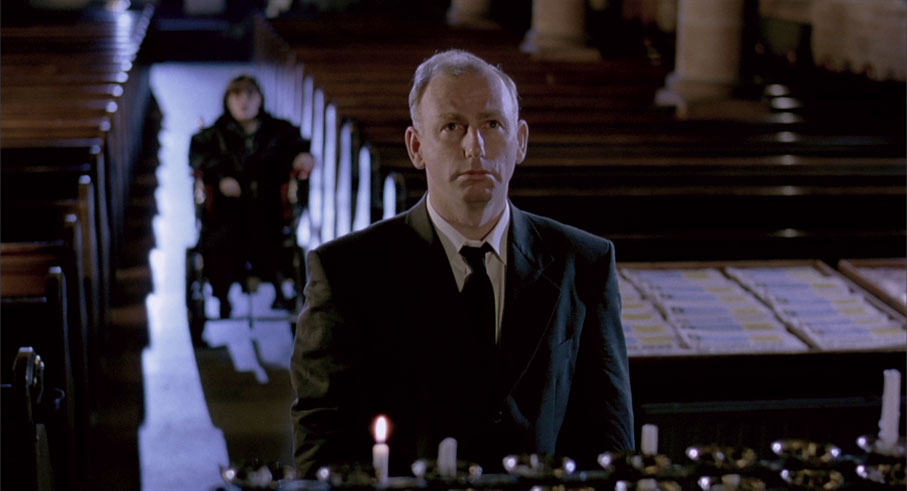
It took a while for it to sink in how effectively the film must have captured the essence of the grieving process for it to have prompted such a reaction, and against my expectations I was drawn back for a third viewing. I absolutely adored it. This time around I was able to experience the film with a more objective eye and appreciate the truth that sat at the film’s core, to see through the distracting veil of personal experience and appreciate not just what Mullan was trying to express but the skill with which he and his talented collaborators had been able to realise it. Having lost a number of people who were close to me over the years in a variety of circumstances, from prolonged illness to sudden and unexpected death, I recognised the elements in each of the stories where the differing manifestations of grief are explored. I also became aware that the visceral reaction I had to the film on that second viewing was down in part to some of it cutting a little too close to the bone. I’ve never gone out seeking vengeance with a sawn-off shotgun (there’s still time...), but just a few days before my father’s funeral, a deeply insulting crack made in a pub by a local hard man prompted my brother-in-law to punch him so forcefully that he was still struggling to get up from the floor as my furious relative made his timely departure. Sheila’s tearful confession that she doesn’t want to a go to a ceremony that she is duty-bound to attend, meanwhile, will touch a nerve that anyone who has lost someone close to them will likely be familiar with, and the scene itself stirred painful memories of watching my sister in a state of hysterical distress as the time came to leave for the burial of her closest friend. And while Thomas’s retreat into the coddling arms of dogmatic faith is alien to my own rejection of religion and its overblown trappings, I can still connect with his obsessive and overly protective attitude to his late mother, and vividly recall my sense of perhaps unreasonable outrage when I noticed that my father’s age had been incorrectly engraved on the lid of his coffin.
Watching the film again, I was also able to reconnect with and better appreciate the blackly comic elements and how they feed organically into the drama, as well as how they are sometimes darkened by it. Nowhere is this more evident than in the now famous scene in which Tanga decides to use the shotgun he has procured for John to give standoffish middle-class Bell (Eric Barlow) a scare, only to catch him masturbating and end up with an eyeful of spunk when Bell ejaculates in shock. Watch this with an audience and the laughter is loud and infectious, primarily due to the horrified Tanga’s immediate reaction (“Ah fuck, I can taste it! It’s in my fuckin’ mouth!”), but once he regains his composure, bursts into the house and starts threatening Bell and making moves to rape his terrified wife, any lingering audience smiles will quickly fade. Intermittently this tonal shift is turned around, with dramatic elements taking a darkly comic and often unexpected turn, as when the injured Michael stops off for a comforting pint in a pub run by the world’s angriest landlord (Alex Norton) and is thrown into the pump room for questioning the man’s furious enforcement of closing time. Here he encounters three other presumably contentious customers who appear to have been imprisoned there for some time, and when they band together to engineer their escape, the amusing but oddball nature of the revenge they meet out re-enforces the scene’s already surrealistic hue. Michael’s angry and extreme parting suggestion over how to punish the landlord, meanwhile, later circles back on him in a manner that brings the darker overtones of the scene into sharp focus, and nearly sees him follow a similar path of destructive overkill being walked by his younger brother.
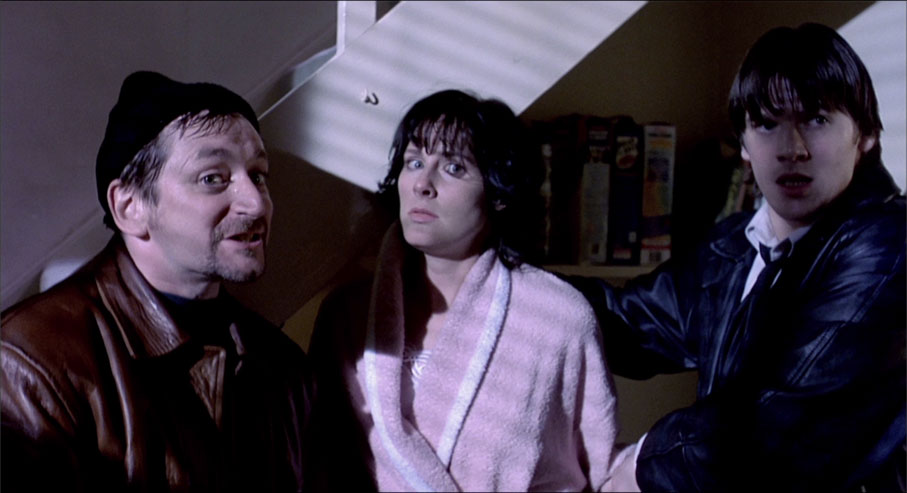
While the climax of his determination to kill Duncan forces John – and, indeed, the audience – to confront the extremity of his actions, it’s Michael’s story that casts the darkest pall over the proceedings and gives the film that sense of overpowering sadness that so coloured my second viewing. As he becomes steadily weaker and paler from blood loss, he almost becomes a metaphor for the crumbling unity of the now rudderless family at the story’s centre, stumbling towards a potentially ignoble death in a misadventure-peppered journey – one that includes visiting his young son and his estranged former partner – that climaxes in an anguished and astonishingly heartfelt cry of “I want my mammy!” (actor Douglas Henshall’s own mother died just weeks before shooting began). It’s moment that so upsets me on every viewing that just the memory of it brings tears to my eyes and prompts my lower lip to wobble.
It’s probably worth mentioning that if you have a problem with strong language then you’re also going to have some serious issues with the dialogue of Orphans (and, indeed, the rest of this paragraph, so be warned), which is earthily true-to-life in its use of certain words. Unsurprisingly, ‘fuck’ gets a serious workout, but you’ll also get to hear ‘cunt’ spat out more times than you might be used to, though in my experience this is a word that the Scots have come close to making their own and which can be used by them every bit as effectively as a term of endearment as it can an insult or a threat. Here it’s always used as an expression of anger or frustration, though sometimes creatively so, as when a furious Michael vents his frustration at Thomas by seething sarcastically, “Good for you, Thomas. Good for useless cuntin’ you!” The thing is, it never feels gratuitous and always truthful to the characters from which these words emanate, just as it feels appropriate that the pious Thomas never swears, and that only in a moment of extreme frustration does the quiet Sheila let rip with a defensively angry “Fuck off!” Whether the portrayal of Sheila’s cerebral palsy is honest and non-exploitive is something former writers for this site who have personal experience of the condition would be in a better position to comment on than me. It’s worth noting, however, that Sheila is based directly on a friend of Mullan’s, that she’s played by someone who has cerebral palsy, and everything that happens to Sheila during the course of that night had previously happened to one-time actor Rosemarie Stevenson, which it turns out was one of the key reasons she wanted to play the role.
John and Sheila’s stories do briefly interconnect with Michael’s, Sheila’s when Michael unknowingly walks past the house to which she has been taken and John’s when he and Tanga drive past him and John fires the shotgun in a fit of jubilation, a moment that seems to send Michael into an anaemic daze. His most significant interaction is with Thomas, who has locked himself inside the church with their mother’s coffin and refuses to let his rain-soaked brother in because he can’t break a promise he made to a priest. It’s typical of the film’s deft blend of drama and black humour that even as Thomas continues his unreasonable bleating, a furious Michael has gained entry anyway because “You left the side door open, you fuckin’ prick!” John spends the night with Tanga, while Sheila spends it in the company of a temporary surrogate family, but in truth all four siblings make the emotional journeys they have embarked on alone. It’s perhaps the honest manner with which the film captures this aspect of grief that hit me the hardest on that second viewing. For some, grief is an experience best coped with when shared and in the company of friends and family. For me, that’s simply never been the case, and even when in good and supportive company, it’s a path I have always felt more comfortable walking alone. We all do, in our way.
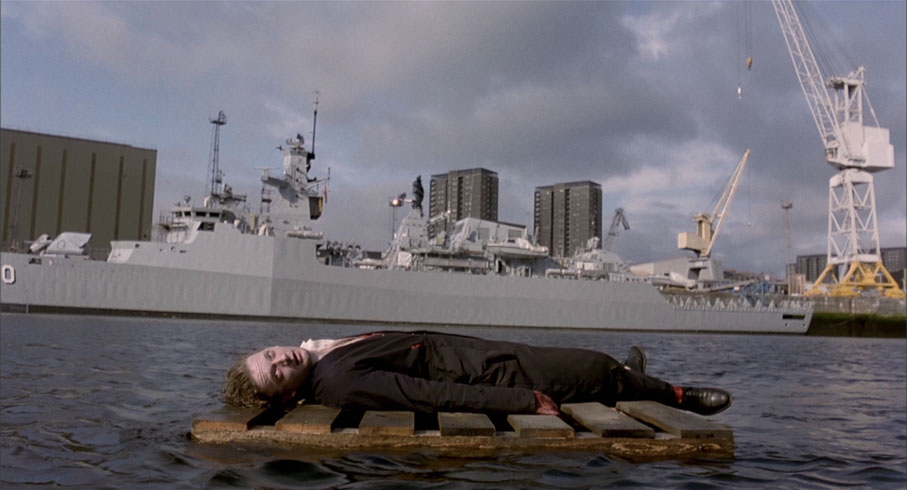
As the night wears on and morning approaches, the surrealistic overtones of earlier scenes go into symbolic and metaphoric overdrive, as a horribly drained Michael (full marks to the makeup team here) slides into the Clyde on a wooden palette in what plays like a cross between a baptism and a crucifixion, and a storm whips up a wind that proves powerful enough to literally raise the church roof. The coda, which takes place some days later in the calm summer light of the graveyard in which the mother is now buried, almost comes as a relief, restoring a more peaceful normality that only previously existed outside of the timeframe of the film. It’s a touching conclusion to a genuinely extraordinary debut feature, one I really liked, then was emotionally stung by, and then fell headlong in love with.
The 1080p 1.85:1 transfer here has been sourced from a Channel 4 remaster, and given the complaints Mullan has about that channel’s treatment of him and his film, it seems almost right that the image is not quite up to Indicator’s usual impeccable standards. Most of the film takes place at night, and while the detail is, for the most part, clearly rendered, if it’s in shadow or on dark clothing then it’s just not there, with some crushing of the contrast plunging some darker areas into a pit of the deepest black. Some of the dimmer sequences also have a slightly grubby feel, which may well be how it played on the cinema screen – it’s just been too long for me to remember. In other respects it’s a solid enough job, with sometimes vibrant colour and a far better contrast balance when the light levels are good (a fairground stall, the funeral, the graveyard coda). It’s also clean, stable, and a fine film grain is visible.
There are two soundtracks on offer, DTS-HD Master Audio 2.0 stereo and DTS-HD Master Audio 5.1 surround. I’m guessing that the stereo is the original mix, and it’s perfectly serviceable, with clear reproduction of the dialogue and Craig Armstrong fabulously mounful score, but as far as I’m concerned it’s there for the sake of completion only, as the 5.1 track really is the only way to go. The surround is louder and brighter here than on the stereo track, and the music and effects sound utterly lovely here. Check out the early Terence Davies-inspired pan into the past, where the thunderclap is downright explosive on the surround track and quieter and more levelled-out on the stereo one.
Optional English subtitles for the hearing impaired are available, and if you struggle at all with Glaswegian accents (and they are strong at times and include localised slang), you’ll be grateful for their assistance.
Audio Commentary with Peter Mullan
Recorded for an earlier DVD release, this commentary by director Peter Mullan is similar in tone to the one on Momentum’s DVD of The Magdalene Sisters, particularly in Mullan’s self-depreciating comments about his own work and his habit of referring to those interested in the technical details of the film as “anoraks,” a pejorative term that has long since fallen out of usage. In common with that commentary, it’s also enjoyably down-to-earth and peppered with revealing details, from the influence of Terence Davies and John Sayles to the elements that were based on personal experience. The most surprising of these is a fistfight he witnessed between two men on a Glasgow street that appeared to have been triggered by a disagreement about whether Jean de Florette or Manon des Sources was the superior movie. Mullan is open about the struggles he faced over whether to keep or cut material he liked but ultimately removed (more than once he directs us to the deleted scenes), intermittently takes the piss out of his own work, and has plenty of negative things to say about “those arseholes at Channel 4” (there’s more on this elsewhere in the extras). While the content is excellent, there are a couple of technical issues that appear to have been inflicted on the commentary before it was supplied to Indicator. The first is that the soundtrack of the film plays in the background and is loud enough at times (particularly when there is music) to almost drown out Mullan’s voice and make genuinely hard to hear what he is saying. The second is that the first half of the commentary is out of sync with the picture by about seven seconds, and while this may not sound particularly problematic, when Mullan references specific shots or edits or lines of dialogue – which he does quite a bit – you have to wait to see or hear what he is talking about and hope you guessed right about the length of the delay (by when he has often moved on to something else). About halfway through this synchronisation differential suddenly corrects itself, and the second half is fine in this respect.
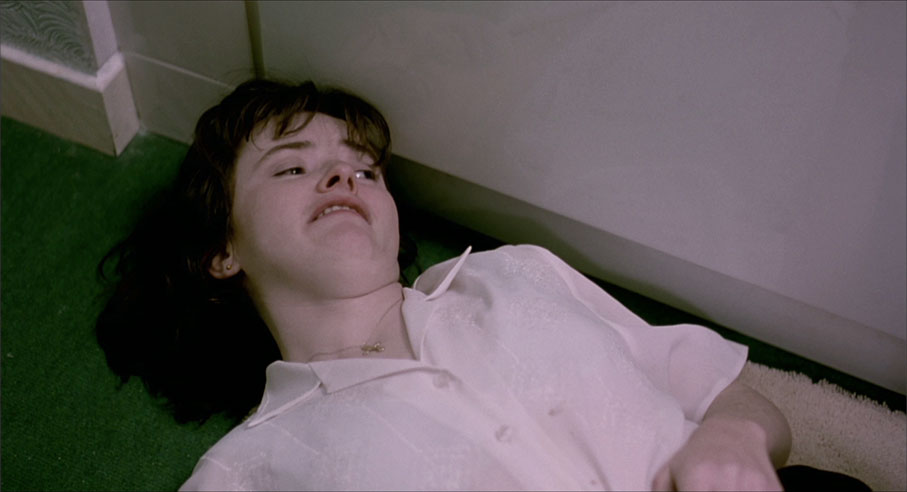
Orphans Reunited (59:49)
A documentary produced by BBC Scotland and first broadcast on 11 May 2019 in which principal cast members Douglas Henshall, Gary Lewis, Stephen McCole and Rosemarie Stevenson meet up and reminisce about the making of the film. But there’s more! Peter Mullan walks the streets of Glasgow and looks back at the making of Orphans and the short films that preceded it, and talks about the influence of early Scorsese and the Bill Douglas Trilogy. His brother Lenny (who has a small role in the film a bar manager) recalls finding Rosemarie Stevenson for the part of Sheila, Alex Norton talks about playing the world’s angriest landlord, and Maureen Carr reveals how she came up with the voice for imprisoned bar customer Minnie (you really have to hear it). Frank Gallagher remembers playing Tanga and revisits the character’s nighttime adventures with John by taking a ride with Stephen McCole, and composer Craig Armstrong talks about the importance a film’s emotional core to the composition of its score. Oh, and critic Hannah McGill is on hand to offer some well argued insights into what makes this film so special. Overall, it’s an excellent companion to the film peppered with engaging and occasionally revealing recollections, while the interviews with Mullan somehow turn up stories that get no coverage elsewhere, from the fact that he and Gary Lewis first met at a young socialist meeting, to an amusing story about the true-life incident that Sheila’s sudden explosion of swearing was based on. Mullan remembers asking Ken Loach (for whom he acted in My Name is Joe during a gap between shooting and editing Orphans) what he thought of the film after its Cannes screening and getting the guarded response, “Marvellous...in bits.” More revealing, perhaps, is when Mullan recalls Loach admitting to him that the kids in Kes weren’t aware they were going to be caned in a key scene, and responds with some passion, “I adore Ken, and I adore his work, but at the same time, if that was my kid I’d be down there with a fucking hammer. I’d smash their fucking camera to smithereens.” This also has optional English subtitles for the hearing impaired.
The Making of Orphans (34:23)
A 4:3 framed and SD resolution piece that was shot during the making of the film and is based around interviews with director Mullan and actors Gary Lewis, Douglas Henshall, Stephen McCole and Rosemarie Stevenson, but also includes some welcome footage of Mullan’s hands-on approach to directing. Some of the material here is repeated elsewhere, but this is the only extra in which Mullan and his actors are not talking about the film in retrospect, and they thus bring slightly different perspectives to their comments than you’ll find elsewhere. Once again, great stuff.
Deleted Scenes (11:20)
Four deleted scenes that can be viewed with or without a commentary from director Peter Mullan. The first and the longest is the original opening, in which the family is united and telling stories around the kitchen table, then end up hugging each other and weeping (intriguingly observed from outside) when their mother’s coffin arrives at the house. The second extends the sequence in which Michael’s stab wound is dressed by Margaret, and includes an assertion from her that the injury needs hospital attention, as well as re-enforcing Michael’s plan to seek compensation by passing it off as a workplace injury. The third adds material to the sequence in which Carole and her friends wheel Sheila to Carole’s home, and the fourth expands on what happens when they arrive and includes a sequence in which Sheila has a screaming fit.
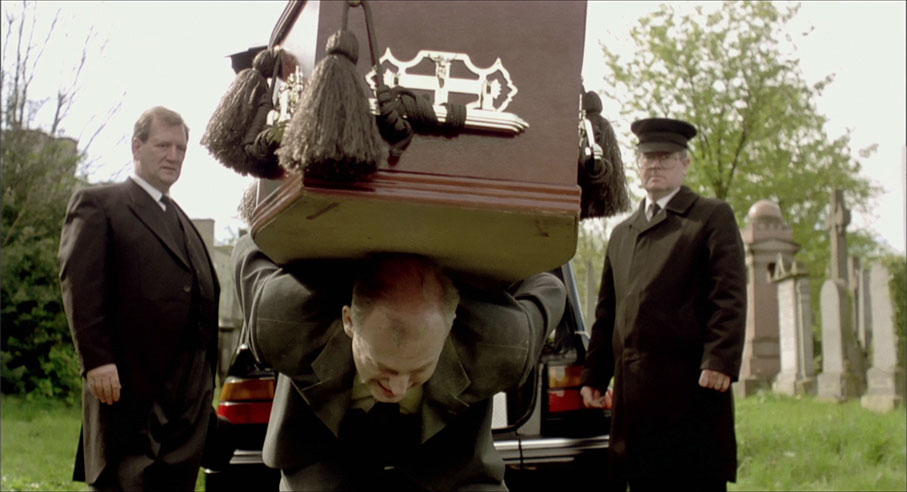
On his commentary track for the first scene, Mullan reveals that all film material of the excised scenes was destroyed by Channel 4 because they thought it was unimportant (the versions here were drawn from a VHS copy), and explains why he cut what is an excellent scene and that he remains uncertain if he made the right decision. In the second he confirms what is only suggested in the film itself, that Margaret is a former nurse who now works as a prostitute. He notes that Stevenson is smiling when being pushed at high speed by the girls in the third scene because she was enjoying the ride (I gather she’s supposed to look frightened), then notes what was lost from the film with the cutting of the final scene, but also explains his reasons for removing it.
Audition Tapes (16:45)
Five clips from the actors’ audition tapes, which can be watched with or without director’s commentary. Well, sort of. I’ll get to that in a second. The first is focused on Gary Lewis as he runs through the scene in which Thomas refuses to open the church door to Michael, who is played here (as he is in the film) by Douglas Henshall. The second is the same scene but focussed exclusively on Henshall but only lasts for 35 seconds. The third has Stephen McCole as John in an argument with Tanga, who is played here by David McKay, who was originally up for the role. The fourth has Frank Gallagher letting rip as Tanga in the sperm-in-the-eye scene. Finally, Rosemarie Stevenson is coached to improvise the bathroom sequence but keeps laughing, which apparently was common during the shoot itself.
Mullan’s commentary here is a lot sparser than it was on the deleted scenes, something is signalled early in the first audition when, after remarking how good the actors are given that this is the first time they had worked together and performed these lines, he says “I’ll shut up and let you guys watch,” seemingly forgetting that we are able to do that anyway by switching the commentary off. He does reveal that David McKay is a close friend (he acted in Mullan’s first short film, Close) and recalls how tough it was telling him that he wasn’t quite right for the role.
Peter Mullan Short Films
For me, this is one the prize inclusions of this release, as my first exposure Mullan the director was not Orphans but his 1995 short film Fridge, which I remember being seriously impressed by. Pleasingly, all three films have optional English subtitles for the hearing impaired.
In Close (1994) (16:45), Mullan plays Vincent, an uptight new father who lives in a small apartment block – or a close, as it is known here – who responds to depraved comments made by of one of his neighbours by beating him to death with a hammer. This extreme act evolves into a determination to “clean up” the close, which he kicks off by shopping a hard-up couple for social security fraud. Then the son of the murdered man turns up looking for his father... A gritty urban Scottish take on Taxi Driver (a film Mullan has cited as a key influence on him and others of his generation) that strips the central character of any dark glamour and paints him as the sociopath he effectively is. Mullan regular Gary Lewis plays a pest control man hired by Vincent to exterminate the bugs he believes are in danger of overrunning his flat (cop that for a metaphor), and the murdered man’s son is played by David McKay, who didn’t get cast as Tanga in Orphans. Douglas Henshall is credited as executive producer.
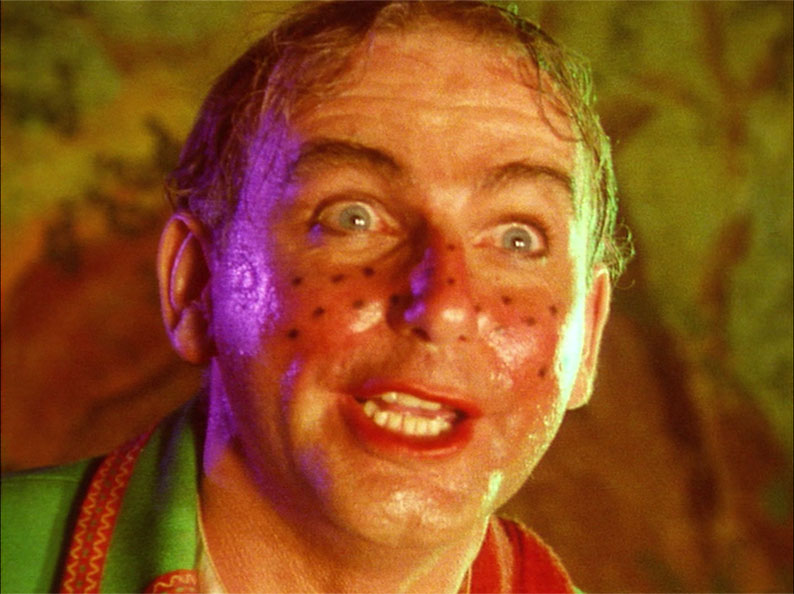
In Good Day for the Bad Guys (1995) (23:17), Mullan plays John, a struggling and unhappy actor who is stuck playing the Big Bad Wolf in a pantomime production of Little Red Riding Hood and is sick of having to play humiliating second fiddle to bullish and egotistical leading man Jockie (a terrific performance from an unchained Gary Lewis). Then one day an explosion of anger on John’s part creates an unexpected opportunity for advancement. Or does it? A more visually polished work than Close (which I really liked, by the way) and a more emotionally complex one that impressively showcases Mullan’s talent both as an actor and director and that paints a grimly vivid picture of pantomime as one of the seven layers of hell. By the way, the word ‘cunt’ appears more times in this film’s 23 minute running time than in the whole of Ophans’ 100 minutes. You have been warned.
Fridge (1995) (20:57) is set in the courtyard of a run-down Glasgow estate, where a young boy hiding in an abandoned chest freezer becomes trapped inside it when another kid slams the lid down on him. The incident is witnessed only by alcoholic couple Rudy and Alice (Gary Lewis and Vicki Masson, both superb), whose efforts to free the boy are frustrated by a jammed lock, their alcoholism, and the isolationist indifference of those whose apartments overlook the courtyard. The first Mullan-directed film I saw still packs a wallop, a grimly realistic parable on how compassion and the very concept of community is being eaten away by a society in which we are encouraged to think only of the self. It’s a really well made, impeccably performed and socially conscious work that bagged its share of festival awards and tonally laid the groundwork for Orphans. I’ll give a special mention to Grant Scott Cameron’s monochrome cinematography, Craig Armstrong’s haunting score and Mullan’s direction and storytelling smarts. All three of the short films here are excellent, but this remains my favourite.
Theatrical Trailer (2:05)
Spoilers aplenty in a trailer that grabs attention-grabbing snippets from every stage of the narrative and labels the film “The darkest comedy of the year,” which is about right.
Booklet
Opening, as ever, with the main credits for the film, this typically strong booklet kicks off with an excellent essay by film critic Michael Pattison, which offers a thoughtful appraisal of the film’s qualities and nicely describes it as “a pile-up of overreactions, a kind of self-deprecating hyperbole.” This is followed by an interview with Peter Mullan conducted in 1999 by Liese Spencer for Sight & Sound, in which Mullan talks about his influences and his intentions for the film – there’s some really good stuff here, in part because Spencer asks such thoughtful questions, to which Mullan always responds in kind. Next we have 1999 piece from The Guardian in which Mullan recalls discovering that Channel 4 had destroyed all of the cut scenes from the film – including the negatives and the soundtrack masters – and muses on the potential consequences. Extracts from three contemporary reviews are next, including one from Film Comment that discusses the (inaccurate) subtitling of the film for its American release, which is followed by credits for Close, Good Day for the Bad Guys and Fridge.
A marvellous exploration of the strength and fragility of family ties and the various ways in which grief can manifest itself, one that so accurately nails these aspects that it managed to piss me off by opening up a portal to memories I was not even aware I had suppressed for so long. Our first late review of the year was delayed primarily because it took me a while to come to terms with the very personal effect that it had on me, but now I won’t hear a word said against what I consider to be one of the finest British films of the pre-millennium decade. Sometimes aggressive contrast aside, the transfer is generally fine, but the special features are absolutely blinding and together with the film itself make this an essential purchase. Highly recommended.
|